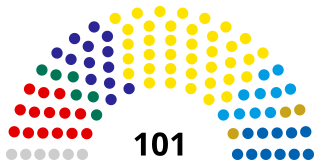
The Riigikogu is the unicameral parliament of Estonia. In addition to approving legislation, the Parliament appoints high officials, including the prime minister and chief justice of the Supreme Court, and elects the president. Among its other tasks, the Riigikogu also ratifies significant foreign treaties that impose military and proprietary obligations and bring about changes in law, as well as approves the budget presented by the government as law, and monitors the executive power.

Parliamentary elections were held in Estonia on 2 March 2003. The newly elected 101 members of the 10th Riigikogu assembled at Toompea Castle in Tallinn within ten days of the election. Two opposing parties won the most seats, with both the Centre Party and Res Publica Party winning 28 seats in the Riigikogu. Res Publica was able to gain enough support in negotiations after the elections to form a coalition government.

Parliamentary elections were held in Estonia on 7 March 1999. The newly elected 101 members of the 9th Riigikogu assembled at Toompea Castle in Tallinn within ten days of the election. The elections proved disastrous for the ruling Estonian Coalition Party, which won only seven seats together with two of its smaller allies. Following the elections, a coalition government was formed by Mart Laar of the Pro Patria Union, including the Reform Party and the Moderates. It remained in office until Laar resigned in December 2001, after the Reform Party had left the same governing coalition in Tallinn municipality, making opposition leader Edgar Savisaar new Mayor of Tallinn. The Reform Party and the Estonian Centre Party then formed a coalition government that lasted until the 2003 elections.

Priit Aimla is an Estonian writer, poet, humorist and politician known for several stage plays and books. During 1992 to 1995, he belonged to the VII Riigikogu, having been elected as a member of the Independent Royalist Party of Estonia; later, he switched to the Estonian Centre Party and was elected as a member of VIII Riigikogu. Since 1999, he has been a member of the Estonian Social Democratic Party.

The following is an alphabetical list of articles related to the Republic of Estonia.
Libertas Estonia was a political party in Estonia. It intended to contend the 2009 European Parliament elections under a common banner with Libertas.eu.
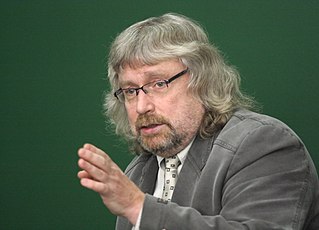
Lauri Vahtre is an Estonian politician, historian, translator and writer.

Tanel Tammet is an Estonian computer scientist, professor, software engineer, and computer programmer. He was also one of the founding members of the Estonian Greens party, and helped found the IT College in Tallinn.
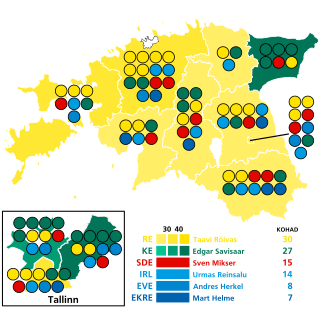
Parliamentary elections were held in Estonia on 1 March 2015. Advance voting was held between 19 and 25 February with a turnout of 33 percent. The Reform Party remained the largest in the Riigikogu, winning 30 of the 101 seats. Its leader, Taavi Rõivas, remained Prime Minister. The newly elected 101 members of the 13th Riigikogu assembled at Toompea Castle in Tallinn within ten days of the election. Two political newcomers, the Free Party and the Conservative People's Party (EKRE) crossed the threshold to enter the Riigikogu.

Yoko Alender is an Estonian architect and politician, member of the XIII, XIV and XV Riigikogu, publisher, educator. Yoko Alender is standing as a candidate in the June 2024 European Parliament elections on the Reform Party list.
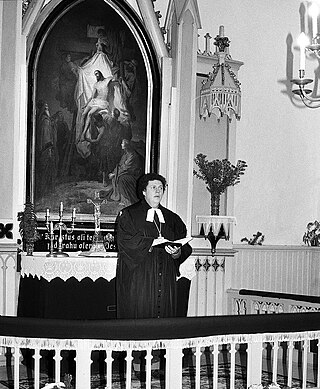
Illar Hallaste was an Estonian cleric, politician, lawyer, and businessman, most notable for being a voter for the Estonian restoration of Independence.

Estonia 200 is a liberal political party in Estonia. Since April 2023, the party has been a junior partner in the third Kallas government.
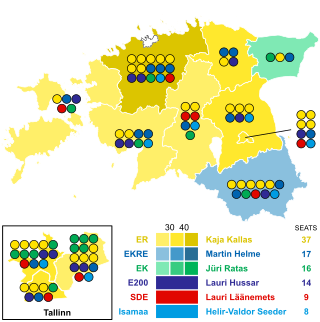
Parliamentary elections were held in Estonia on 5 March 2023 to elect all 101 members of the Riigikogu. The officially published election data indicate the victory of the Reform Party, which won 37 seats in total, while the Conservative People's Party of Estonia (EKRE) placed second with 17 seats. The Centre Party won 16 seats, a loss of 10, while Estonia 200 won 14 seats, gaining representation in the Riigikogu.
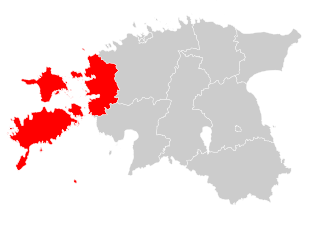
Electoral district no. 5 is one of the 12 multi-member electoral districts of the Riigikogu, the national legislature of Estonia. The district was established as electoral district no. 6 in 1992 when the Riigikogu was re-established following Estonia's independence from the Soviet Union. It was renamed electoral district no. 5 in 1995 following the re-organisation of electoral districts. It is conterminous with the counties of Hiiu, Lääne and Saare. The district currently elects six of the 101 members of the Riigikogu using the open party-list proportional representation electoral system. At the 2019 parliamentary election it had 51,093 registered electors.

Electoral district no. 12 is one of the 12 multi-member electoral districts of the Riigikogu, the national legislature of Estonia. The district was established in 1992 when the Riigikogu was re-established following Estonia's independence from the Soviet Union. It was renamed electoral district no. 11 in 1995 following the re-organisation of electoral districts but reverted to electoral district no. 12 in 2003. It is conterminous with the county of Pärnu. The district currently elects seven of the 101 members of the Riigikogu using the open party-list proportional representation electoral system. At the 2019 parliamentary election it had 66,852 registered electors.
Electoral district no. 8 was one of the multi-member electoral districts of the Riigikogu, the national legislature of Estonia. The district was established in 1992 when the Riigikogu was re-established following Estonia's independence from the Soviet Union. It was abolished in 1995. It was conterminous with the counties of Järva and Lääne-Viru.
Electoral district no. 9 was one of the multi-member electoral districts of the Riigikogu, the national legislature of Estonia. The district was established in 1992 when the Riigikogu was re-established following Estonia's independence from the Soviet Union. It was abolished in 1995. It was conterminous with the counties of Jõgeva and Viljandi.
This is a list of the members of the Riigikogu, following the 1992 election.
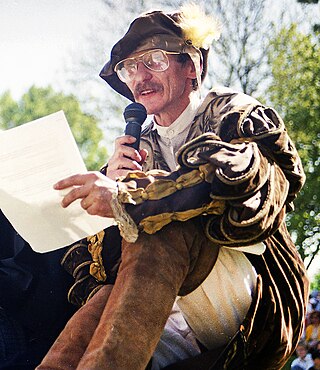
Ralf R. Parve is an Estonian humorist, radio personality and politician. He was a member of VII Riigikogu, representing the Estonian Centre Party.

Kristo Enn Vaga is an Estonian racing cyclist and politician representing the Estonian Reform Party. Following the 2023 Estonian parliamentary election, he was elected to the Riigikogu.















